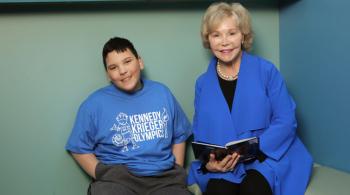By E. Mark Mahone, PhD
Former Director, Intellectual and Developmental Disabilities Research Center
Kennedy Krieger Institute/The Johns Hopkins University
Greetings from the Kennedy Krieger Institute/Johns Hopkins University Intellectual and Developmental Disabilities Research Center (IDDRC)! Our center is one of 14 IDDRCs around the U.S., and all 14 are funded by the Eunice Kennedy Shriver National Institute of Child Health and Human Development (grant number U54 HD079123). In this issue, I would like to provide a few updates on our center and highlight the integrated work of the national IDDRC network.
First, with longstanding support from Kennedy Krieger, our center continues to play a central role in intellectual and developmental disabilities (IDD) research and serves as a national resource for investigators, caregivers and patients. During the recent funding period (September 23, 2014, to present), our center supported a total of 234 funded research projects involving 165 principal investigators, resulting in 479 peer-reviewed publications in the field of IDD. A total of 107 of these projects are ongoing in 2020, setting the stage for breakthroughs to better understand the biomarkers of and treatments for many forms of IDD.
Secondly, as a network, the 14 IDDRCs collaborate regularly to disseminate scientific information to the public. This dissemination occurs through national and international presentations, peer-reviewed publications (e.g., our annual special issue of the Journal of Neurodevelopmental Disorders), and via publicly accessible material published in collaboration with the Association of University Centers on Disabilities (AUCD). These web-based updates occur via mechanisms such as the monthly e-newsletter AUCD 360 and the annual issue of the IDDRC Reporter.
The most recent issue of the IDDRC Reporter (January 2019), “Role of IDDRC Network in Recent Developments in the Treatment of Urea Cycle Defects,” highlights the importance of the national IDDRC network in scientific discovery. Urea cycle disorders are rare but often devastating conditions associated with irreparable brain damage, severe learning disability, epilepsy and serious limitations of speech and motor functioning. The article reminds us of the historic significance of our center in treating these conditions. In the late 1970s, Mark Batshaw, MD, and Saul Brusilow, MD, then working at the (then-named) John F. Kennedy Institute for Handicapped Children, were studying ketoacids related to a specific urea cycle defect (citrullinemia). A colleague at the Institute directed them to a 1914 publication about treatment with sodium benzoate to reduce urea excretion. That study led Drs. Batshaw and Brusilow to implement a similar compound (phenylacetate) to effectively lower blood ammonia in those with urea cycle defects.
Of note, Dr. Batshaw and Hugo W. Moser, MD, PhD, former president of Kennedy Krieger, were the founding associate directors of the John F. Kennedy Institute for Handicapped Children’s Developmental Disabilities Research Center. Ultimately, the establishment of the IDDRC at Kennedy Krieger and The Johns Hopkins University in 1987 contributed to these and many other significant initiatives, with core facilities at Kennedy Krieger supporting experimental design and analysis for studies in humans and animals. Dr. Batshaw went on to establish IDDRCs at Children’s Hospital of Philadelphia and Children’s National Hospital in Washington, D.C. These centers remain in operation today and collaborate to form the Mid-Atlantic Consortium of IDDRCs.
Please visit our website at KennedyKrieger.org/IDDRC for more information about the IDDRC at Kennedy Krieger and Johns Hopkins.









